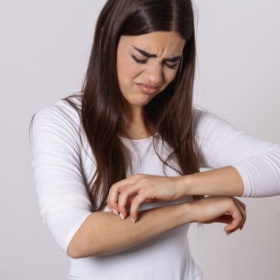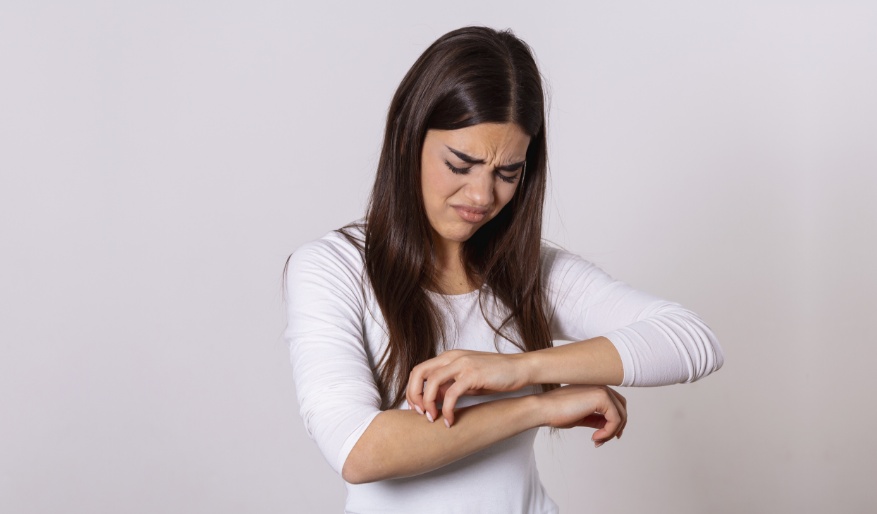Our Doctors
Meet all the doctors from Cleveland Clinic Abu Dhabi.
View Doctors
These common skin conditions aren’t as similar as you may think

Eczema and psoriasis are common skin conditions. Both present with similar symptoms, including red, itchy and flaky skin. But while they may appear to be similar, they need to be managed and treated differently, so it’s always important to get any skin complaint properly diagnosed.
The reason eczema and psoriasis are so often confused is down to the way they look and feel. To most people, they appear the same, both causing inflammation or rashes on the skin, with bumps, cracks, dry patches and scales.
But as well as looking the same, eczema and psoriasis are similar in other ways. Neither are infectious meaning you can’t catch them from contact with another person. And both can affect anyone, at any age.Due to the visual similarities, to confirm a diagnosis your doctor will look at lots of factors. They will explore your medical history and discuss other medicals conditions you might have.
Differentiating factors include:
1. Appearance
Despite the similarities between eczema and psoriasis, a doctor will examine your skin to identify some tell-tale differences.
Psoriasis tends to cause thicker flakes than eczema. These silver-colored scales are called plaques and tend to be raised and painful.
Eczema can often be identified due to the presence of fluid, which is a result of the inflammation and is called weeping eczema.
2. Onset
Psoriasis usually appears in younger adults but also affects older people. Eczema on the other hand usually affects children, although it can be triggered by an allergic reaction in adults.
3. Affected areas of the body
Psoriasis is most commonly found on the knees, elbows, lower back or scalp. It can also affect the face, feet and nails.
In contrast, eczema often appears behind the knees, inside the elbows, around the eyes or on the neck. It can also affect the feet, hands and ankles.
4. Causes
The exact cause of psoriasis is not known, but triggers can include stress, infections, injuries, cold weather and some drugs.
Eczema is triggered by different things in different people, most commonly allergies, smoke and other air pollutants, harsh chemicals, humid weather and certain fabrics.
Both psoriasis and eczema are chronic conditions which means that they won’t go away. However, there are many treatments – including taking good care of your skin – which can help ease the symptoms of both.
Keeping skin hydrated from the inside and outside is key for any dry skin condition. Drink plenty of water and keep your skin hydrated by applying unperfumed moisturizer regularly.
Taking plenty of exercise and eating a healthy, balanced diet will also have an impact on the health of your skin. Certain diets are associated with a reduction in inflammation, so speak to your doctor about what you should be eating to reduce the risk of a psoriasis or eczema flare-up.
For more severe cases your doctor may consider cortisone cream, light therapy, immunosuppressive drugs or biologic treatments. However, an accurate diagnosis will be essential as drugs that work for one condition, may not work for the other.
Always see your doctor if you have an itchy rash that isn’t going away. A confirmed diagnosis will help you manage the symptoms as quickly and as effectively as possible.